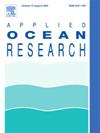An evaluation method for pipeline corrosion risk index weighting in beach and sea oil fields based on combined weighting with improved hierarchical analysis and Bayesian networks
IF 4.3
2区 工程技术
Q1 ENGINEERING, OCEAN
引用次数: 0
Abstract
Coastal oil and gas pipelines are prone to corrosion due to complex environmental factors, while traditional risk assessment methods often suffer from subjective bias and oversimplified, one-sided weighting strategies. To address these limitations, this study proposes a risk evaluation model based on game theory, combining an improved analytic hierarchy process (AHP) and a Bayesian network for composite weighting. First, a coastal pipeline corrosion leakage risk indicator system is constructed. Next, a gray relational analysis-improved AHP model is introduced for hierarchical weighting. A Bayesian network model is constructed using the T-S fuzzy fault tree, and probability weighting is performed through hierarchical importance analysis. Finally, based on game theory, the above two weightings are combined to calculate the composite weight. Additionally, to verify the model's applicability, a corrosion risk assessment for a coastal pipeline was conducted. The results indicated that the model could effectively mitigates the over-reliance on expert subjective judgment and fragmented analysis of risk factors in corrosion risk assessment for coastal oil and gas pipelines, Critical factors such as high sand content and external coating failure were identified as dominant risks, which were overlooked in conventional models. The evaluation results were generally consistent with the actual situation.
基于改进层次分析法和贝叶斯网络联合加权的滩海油田管道腐蚀风险指标加权评价方法
由于环境因素复杂,沿海油气管道容易发生腐蚀,而传统的风险评估方法往往存在主观偏差和过于简化、片面的加权策略。针对这些局限性,本研究提出了一种基于博弈论的风险评估模型,结合改进的层次分析法(AHP)和贝叶斯网络进行复合加权。首先,构建沿海管道腐蚀泄漏风险指标体系。其次,引入灰色关联分析改进的AHP模型进行层次加权。利用T-S模糊故障树构造贝叶斯网络模型,通过层次重要性分析进行概率加权。最后,基于博弈论,将上述两种权重组合,计算出复合权重。此外,为了验证模型的适用性,对某沿海管道进行了腐蚀风险评估。结果表明,该模型可以有效缓解沿海油气管道腐蚀风险评估中过于依赖专家主观判断和风险因素分析的碎片化问题,将高含砂量和外涂层失效等关键因素识别为传统模型忽略的主导风险。评价结果与实际情况基本一致。
本文章由计算机程序翻译,如有差异,请以英文原文为准。
求助全文
约1分钟内获得全文
求助全文
来源期刊

Applied Ocean Research
地学-工程:大洋
CiteScore
8.70
自引率
7.00%
发文量
316
审稿时长
59 days
期刊介绍:
The aim of Applied Ocean Research is to encourage the submission of papers that advance the state of knowledge in a range of topics relevant to ocean engineering.
 求助内容:
求助内容: 应助结果提醒方式:
应助结果提醒方式:


